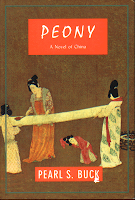 I've noticed something strange about myself. If there's a book I was required to read in school, even though I love reading and never minded being assigned literature, I look back on it with distaste. I like everything by Ernest Hemingway except The Old Man and the Sea. I dislike Shakespeare's plays, but love his sonnets. I couldn't stand One Hundred Years of Solitude, but enjoyed Love in the Time of Cholera. I didn't get Of Mice and of Men, but I liked Cannery Row and The Grapes of Wrath.
I've noticed something strange about myself. If there's a book I was required to read in school, even though I love reading and never minded being assigned literature, I look back on it with distaste. I like everything by Ernest Hemingway except The Old Man and the Sea. I dislike Shakespeare's plays, but love his sonnets. I couldn't stand One Hundred Years of Solitude, but enjoyed Love in the Time of Cholera. I didn't get Of Mice and of Men, but I liked Cannery Row and The Grapes of Wrath.I like John Steinbeck because he makes sense of California for me. Even though I grew up there, I grew up in the desert, and SoCal gets no press beyond Hollywood. I always wondered what the state flower, the California Poppy, looked like because I'd never seen one. And if I'd never seen one, why is it the state flower? Northism, thats why.
But while Steinbeck wrote nothing about SoCal, he did write about the lushness that used to be. Even in the desert, when I was a kid, there were caterpillars, stick bugs, praying mantises, and wildflowers galore. We'd find geodes just lying around in empty lots, waiting to be cracked open. I haven't seen a geode or a stick bug since I was seven or so.
I also enjoy his studies of human nature. He seems able to look at the human condition with the fond objectivity of an indulgent divine being.
This book is essentially about free will. The characters in the story are assigned destinies from the beginning, and the question is whether they'll be trapped in those destinies or if they'll escape them. If they can escape them, and if it's proper to do so.
The device he uses is the Old Testament story of Cain and Abel. And while that's an interesting concept, it's too obvious. Too obvious to do anything for me, anyway. There are several scenes in which certain characters sit around and discuss free will and such, but while it's meant to sound deep, it comes across as stupefying. Like men sitting around discussing whether the ideal sandwich should contain pickles. Or like the great computer in Hitchhiker's Guide to the Galaxy that comes up with the answer of 42 to the Ultimate Question.
42? How can the answer be so simple? Well, why should it be complicated? We make things complicated because we like things to be complicated. Complications justify our bad dreams and our worse poetry. A good puzzle gives us the excuse to wallow, or debate, or instigate warfare. So even where a simple answer exists, which I suspect is more often than not, we need to invent a good meaty puzzle to make it worthwhile. And that's what this book does.
The story is interesting enough to keep me reading, but not so interesting that I was disappointed when it was over. I enjoyed it to an extent, but while I'd recommend it for the Historical and geographical interest, I'd give it a pass on the rest.
Widget by Css Reflex | TutZone








